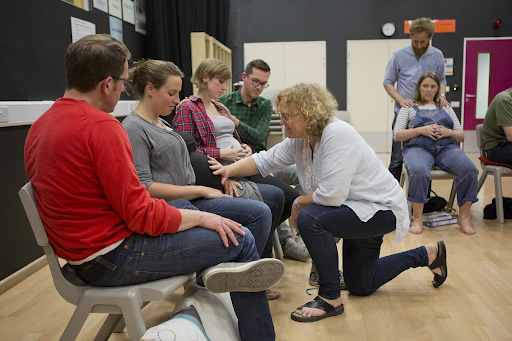The UK government provides funding for pre-school education through the Early Years Foundation Stage (EYFS) framework.
This framework sets out the standards that all pre-school providers must adhere to, ensuring that children receive high-quality education and care. Pre-school education in the UK is provided by a range of providers, including nurseries, playgroups, child-minders and preschools. Each provider follows the EYFS framework, but they may offer different approaches and activities. Parents can choose the type of pre-school education that suits their child best. Some may prefer a nursery or preschool that is attached to a primary school, while others may opt for a child-minder who provides care in their own home. The early years of a child’s life are filled with rapid development and growth, laying the foundation for their future education and well-being. In the United Kingdom, pre-school education plays a crucial role in preparing children for their formal schooling years. In this blog post, we will delve into the fascinating world of pre-school education in the UK, exploring the age range, curriculum, benefits, and the importance of this vital stage in a child’s educational journey.Age Range and Admission
Pre-school education in the UK typically caters to children aged three to four years old. It serves as a bridge between the early years of nursery and the formal start of primary school. While attendance is not compulsory, it is highly encouraged as it provides children with valuable opportunities to develop social, emotional, and cognitive skills. Parents have the option to choose between various pre-school settings, including nursery schools, playgroups, and privately-run establishments.Curriculum and Learning Approach
The pre-school curriculum in the UK focuses on a child’s holistic development, with a balance of structured learning activities and child-led play. The Early Years Foundation Stage (EYFS) framework provides guidance to pre-schools, outlining seven key areas of learning: communication and language, physical development, personal, social, and emotional development, literacy, mathematics, understanding the world, and expressive arts and design. Through a combination of teacher-guided activities and child-initiated exploration, pre-schoolers are encouraged to develop their social skills, problem-solving abilities, and creativity. Play-based learning forms the core of the curriculum, fostering curiosity, imagination, and a love for learning. Educational professionals in pre-schools create stimulating environments that support children’s natural curiosity and provide ample opportunities for hands-on experiences, sensory play, and interactive learning.WHAT ARE THE BENEFITS OF PRE-SCHOOL?
There are so many benefits to your child attending pre-school. One of the biggest benefits is for their own development. By attending a setting at an early age, they will learn that even though you may leave them, you will always come back at the end of the day to pick them up. They will learn to become more independent and less reliant on always having a parent with them to do things for them. By leaving them at a pre-school that you are happy with then you will know that they are safe and happy, and it will also help you to get used to being away from them. It can be difficult for both you and your child if, when they start full time primary school, they have to go from being with you all the time to suddenly being at school for 7 hours, 5 days a week.Aside from the emotional benefits, there are so many other benefits to pre-school including:
- Building social skills
- Giving them a start to education
- Increased concentration
- Improved confidence and self esteem
- Stronger communication skills
The Benefits of Nursery Schools: Why Early Childhood Education Matters
Nursery schools in the UK follow the Early Years Foundation Stage (EYFS) framework, which sets out the standards for the quality of education and care that children should receive. The EYFS framework is designed to ensure that children are well-prepared for their future learning and school life. At nursery schools, children learn through play-based activities such as storytelling, painting, drawing, singing, and physical activities. These activities help to develop children’s language and communication skills, creativity, problem-solving abilities, and physical coordination. Nursery schools have qualified teachers who are trained to work with young children. They create a safe and nurturing environment where children can learn and grow at their own pace. They also work closely with parents to ensure that children receive the best possible education and care. Nursery schools are available in a variety of settings, including private and public schools, community centers, and charitable organizations. Parents can choose the type of nursery school that suits their child’s needs and their family’s budget.Unlocking the Potential of Primary School Education in the UK
Primary school is the first stage of compulsory education in the UK. It is a crucial time for children to acquire the basic skills and knowledge they need to succeed in their academic journey. Primary school education in the UK is divided into two stages: Key Stage 1 and Key Stage 2. Key Stage 1 includes children aged 5-7 years old, while Key Stage 2 includes children aged 7-11 years old. During these stages, children are taught a range of subjects, including English, mathematics, science, history, geography, music, art, and physical education.THE PRE-SCHOOL GUIDE FOR PARENTS IN THE UK
When you are a first-time parent, pre-school can seem pretty daunting and a little overwhelming. Ultimately, pre-school is a setting that will help your little ones develop the skills they will need when they start school at around the age of 4, but there is so much to do when it comes to finding a place that is right for you and your child. If the idea of finding a pre-school feels a bit overwhelming and unknown, then fear not as we are here with our guide to help parents with all things pre-schools.
What is a preschool?
Preschools in the UK are similar to day nurseries, with a few key differences, such as:- Preschools only take children from ages 2 to 3, whereas nurseries usually take younger children too
- Although both follow the same early years’ curriculum, learning is slightly more structured in preschools and will usually involve at least one qualified teacher
- Preschools are often based within a school setting, such as a primary school, although the running of the facility is contracted out to a private, public, or voluntary provider
 You can choose to keep your child in a day nursery or transfer them to a preschool. The advantage of a preschool is that it is more akin to primary school, so many consider it to prepare toddlers better for the UK education system. However, parents may prefer to keep their children in a day nursery if they are well settled and happy.
You can choose to keep your child in a day nursery or transfer them to a preschool. The advantage of a preschool is that it is more akin to primary school, so many consider it to prepare toddlers better for the UK education system. However, parents may prefer to keep their children in a day nursery if they are well settled and happy.What do children do at preschool?
Preschools in the UK are usually open from Mondays to Fridays, 08:00 to 17:00. They close during the school holidays. A typical preschool day involves a similar mix of play and developmental learning that you find at nurseries. However, there is more emphasis on the academic aspects. Children will spend more time on reading, basic math, communication activities, and building cognitive skills. Sessions tend to be more structured, starting and finishing at set times, whereas there is more open play at day nurseries. However, there is still plenty of play, such as arts and crafts or music sessions where children can learn basic musical instruments. There is also a strong emphasis on social and emotional development.What is early-years education?
Years of education prior to age five are sometimes called pre-school, nursery, early-years education, or the early years’ foundation stage (EYFS). The reception class of a primary school is included as part of the EYFS. The Early Years Foundation Stage ends when a child enters Year 1, which is also the first year of Key Stage 1.What is the compulsory school age?
Though most children start school at the age of four, the compulsory school age, defined by the government is the date of the start of term after their fifth birthday, so this could be in September, after Christmas, or after Easter. However, the majority of children start at the beginning of the school year in September.Nurseries for children with Special Educational Needs (SEN) in the UK
All nurseries in the UK must cater to and support children with special educational needs (SEN). They are also required to have a Special Educational Needs Coordinator (SENCO) in all countries apart from Scotland. The SENCO ensures that suitable facilities and activities are available for children with physical disabilities or learning difficulties. You can also find nurseries catering exclusively to children with SEN in the UK. These may be part of a specialized school or run by organizations such as the I Can communication charity.
Families are entitled to free education and childcare for two-year-olds and up to 30 hours of free childcare for three to four-year-olds.
You can also find nurseries catering exclusively to children with SEN in the UK. These may be part of a specialized school or run by organizations such as the I Can communication charity.
Families are entitled to free education and childcare for two-year-olds and up to 30 hours of free childcare for three to four-year-olds.What are Sure Start Centres?
The Sure Start program began in the late 1990s as a government scheme to ensure that children across the UK had equal access to early learning and childcare. The UK set up Sure Start Children’s Centers that provided a wide range of services relating to childcare, children’s healthcare, education, and parenting programs.


